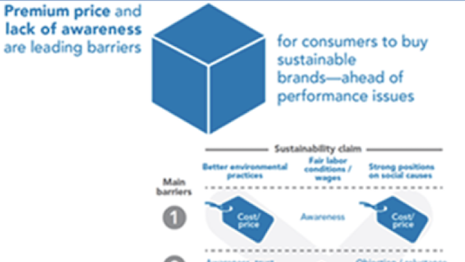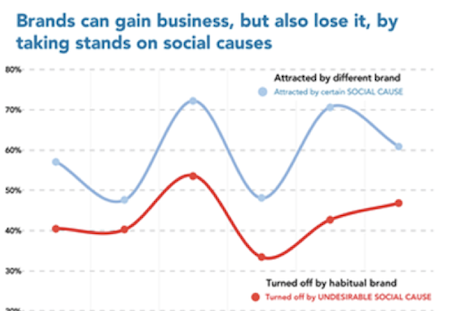- About
- Subscribe Now
- New York,
February 14, 2020

 Premium price and lack of awareness are barriers to purchases of sustainably made products. Source: The Conference Board.
Premium price and lack of awareness are barriers to purchases of sustainably made products. Source: The Conference Board.
The price premium associated with sustainable products and communications challenges are key deterrents for consumers to buy from marketers with sustainability-oriented practices.
A new Conference Board survey of 30,000 consumers across 60 countries particularly faulted communications for consumers insufficiently knowing about, trusting and understanding brands’ sustainability claims. Still, there is an opportunity for luxury marketers to improve messaging to appeal to sustainable shoppers as a brand’s eco-friendly practices rank as the top feature that most influences consumers’ brand choice.
“Many luxury goods actually align with sustainability,” said Denise Dahlhoff, senior researcher for consumer research at the Conference Board, New York.
“If you think of high-quality goods, that also means that these items are durable and have longevity and often a classic style," she said. "It is a good opportunity for luxury companies to highlight these features in the positioning.”
The Conference Board is a member-driven think tank.
Double-edged sword
Shoppers are more likely to be attracted to brands that endorse the social causes they care about such as sustainability or equality.
Interestingly, consumers are more likely to shop from a brand because they really agree with their position, as opposed to leaving a brand from whom they typically buy because they do not like their position.
This does not mean that brands should take positions on social values. Brands that remain silent on a cause may fare better.
The report revealed that almost half of all consumers admitted to avoiding brands that take a stand on social causes for several reasons. These factors include not believing that brands should take social positions, not wanting their purchases to seem like an endorsement, or disagreement with the position.
“When brands support social causes, taking positions on immigration or gender issues or gun control or race relations or the like, there is a risk,” Ms. Dahlhoff said.
“It is really tricky for brands to take positions on social topics," she said. "Many people think it shouldn’t be a brand’s role. They don’t want their purchases to seem like an endorsement or they disagree with the position.
 Brands can gain business, but also lose it by taking stands on social causes. Source: The Conference Board.
Brands can gain business, but also lose it by taking stands on social causes. Source: The Conference Board.
Before a company takes on a cause, they should do research around customer and employee values and ensure that it aligns with the purpose.
Additionally, causes should authentically fit the brand’s positioning.
“When brands do take a position, it should fit their brand authentically,” Ms. Dahlhoff said. “If you are addressing an issue that has nothing to do with your business, it is just random, it doesn’t make must sense.
“And your company’s actions should live up to those positions,” she said. “If you support mental wellness, then make sure you offer health benefits that also cover mental wellness. Walk the talk.”
Sustainability means …
Around the globe, the majority of shoppers think of the environment, recycling and solar and wind power when they hear the word "sustainability."
Consumers consider sustainability issues ahead of social issues such has fair working conditions.
The word "sustainability" has a different connotation, no matter where you are in the world.
In North America, consumers usually associate "sustainability" with recycling. In Europe, the Middle East and Africa, people think of a fair price. Consumers in Latin America hear the word and think alternative sources of energy. Whereas in the Asia-Pacific region, people often think of the environment.
Because of these cultural differences, brands should develop marketing and communications that speak to a consumer’s location.
“If you are a global brand, you have to think about your communications and consider localizing your communications, as well as your initiatives,” Ms. Dahlhoff said.
Luxury innovations
Sustainability is a huge opportunity for luxury brands that are known for their creativity and innovation. The sector could become a leader in sustainability through a variety of actions.
For instance, luxury brands and retailers that sell secondhand items or are adopting rental models are showing leadership.
The U.K.'s BAFTA film awards this year encouraged guests to wear sustainable outfits such as vintage or previously worn items. The Duchess of Cambridge, a major influencer in fashion worldwide, took the cue and donned a dress she had worn years ago.
Luxury marketers can develop sustainable fabrics that become the standard across the industry. Adopting this approach could appeal to younger audiences, particularly values-conscious millenials and Gen Z.
“There is an opportunity for luxury brands to take a leadership role, and encourage sustainable consumption,” Ms. Dahlhoff said.
“There is an opportunity to innovate," she said. "If people don’t buy as many clothes, then there could be a different business opportunity like providing styling services. Luxury brands should be leaders in this evolution.”
Share your thoughts. Click here